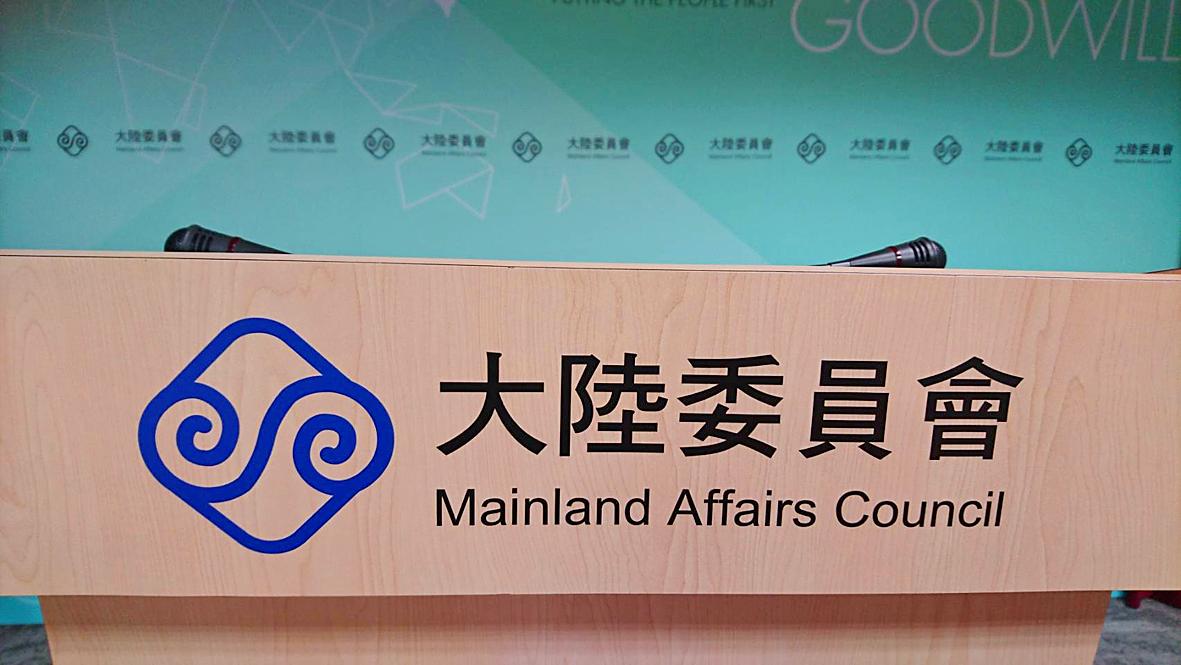The Mainland Affairs Council (MAC) yesterday denied an accusation by the Hong Kong-Taiwan Economic and Cultural Co-operation and Promotion Council that its Taiwanese counterpart in the territory was “interfering with Hong Kong’s internal affairs.”
The Hong Kong council leveled the accusation after Taipei’s Taiwan-Hong Kong Economic and Cultural Co-operation Council this month announced it would establish a Taiwan-Hong Kong Services and Exchanges Office to facilitate humanitarian aid for Hong Kongers.
The new office is scheduled to begin operations on Wednesday.

Photo: Chung Li-hua, Taipei Times
The MAC yesterday asked the Hong Kong council to “not misinterpret” the government’s intentions.
The two Taiwan-Hong Kong councils were established in 2010 to facilitate economic and cultural exchanges.
They held annual exchanges for several years following their establishment, but ties have grown cold in the past few years, a source said.
The Hong Kong council yesterday criticized its similarly named Taiwanese counterpart, saying it had “unilaterally decided” to establish the humanitarian unit.
The office “runs counter to the intention in establishing” the two councils, it said.
“Providing shelter to rioters who destroy the stability of a prosperous Hong Kong is harmful to the people of Taiwan and provides them with no benefit,” it said.
It “strongly demanded” that the Taiwan council not do anything that “does not conform with” its purpose, it added.
It would not communicate with the Taiwan council on any of the actions being taken by the office, it said.
The MAC said that Taiwan’s concerns about the situation in Hong Kong echoed those of the international community.
However, Taipei has never sought to interfere in Hong Kong’s affairs, the MAC said.
The new office’s purpose was to assist Hong Kongers with issues related to investment, study and employment in Taiwan, and emigration to Taiwan, the MAC said.
The issues were being handled within the scope of Taiwanese law and on the basis of humanitarian considerations, it said.
The office’s efforts would conform with the intentions behind the establishment of the Taiwan council, the MAC said, adding that Hong Kong authorities should work with Taiwanese authorities in the interest of the rights of Taiwanese and Hong Kongers.
Taiwanese authorities hope that Taiwan-Hong Kong relations would improve, but the Hong Kong council had unilaterally put off joint conferences, which harmed ties and cooperative efforts by the two councils, the MAC said.
The Hong Kong government should not, on the basis of unreasonable political considerations, interfere with the Taiwan council’s operations, it said.
This story has been amended since it was first published.

NATIONAL SECURITY THREAT: An official said that Guan Guan’s comments had gone beyond the threshold of free speech, as she advocated for the destruction of the ROC China-born media influencer Guan Guan’s (關關) residency permit has been revoked for repeatedly posting pro-China content that threatens national security, the National Immigration Agency said yesterday. Guan Guan has said many controversial things in her videos posted to Douyin (抖音), including “the red flag will soon be painted all over Taiwan” and “Taiwan is an inseparable part of China,” while expressing hope for expedited “reunification.” The agency received multiple reports alleging that Guan Guan had advocated for armed reunification last year. After investigating, the agency last month issued a notice requiring her to appear and account for her actions. Guan Guan appeared as required,

A strong cold air mass is expected to arrive tonight, bringing a change in weather and a drop in temperature, the Central Weather Administration (CWA) said. The coldest time would be early on Thursday morning, with temperatures in some areas dipping as low as 8°C, it said. Daytime highs yesterday were 22°C to 24°C in northern and eastern Taiwan, and about 25°C to 28°C in the central and southern regions, it said. However, nighttime lows would dip to about 15°C to 16°C in central and northern Taiwan as well as the northeast, and 17°C to 19°C elsewhere, it said. Tropical Storm Nokaen, currently

‘NATO-PLUS’: ‘Our strategic partners in the Indo-Pacific are facing increasing aggression by the Chinese Communist Party,’ US Representative Rob Wittman said The US House of Representatives on Monday released its version of the Consolidated Appropriations Act, which includes US$1.15 billion to support security cooperation with Taiwan. The omnibus act, covering US$1.2 trillion of spending, allocates US$1 billion for the Taiwan Security Cooperation Initiative, as well as US$150 million for the replacement of defense articles and reimbursement of defense services provided to Taiwan. The fund allocations were based on the US National Defense Authorization Act for fiscal 2026 that was passed by the US Congress last month and authorized up to US$1 billion to the US Defense Security Cooperation Agency in support of the

PAPERS, PLEASE: The gang exploited the high value of the passports, selling them at inflated prices to Chinese buyers, who would treat them as ‘invisibility cloaks’ The Yilan District Court has handed four members of a syndicate prison terms ranging from one year and two months to two years and two months for their involvement in a scheme to purchase Taiwanese passports and resell them abroad at a massive markup. A Chinese human smuggling syndicate purchased Taiwanese passports through local criminal networks, exploiting the passports’ visa-free travel privileges to turn a profit of more than 20 times the original price, the court said. Such criminal organizations enable people to impersonate Taiwanese when entering and exiting Taiwan and other countries, undermining social order and the credibility of the nation’s